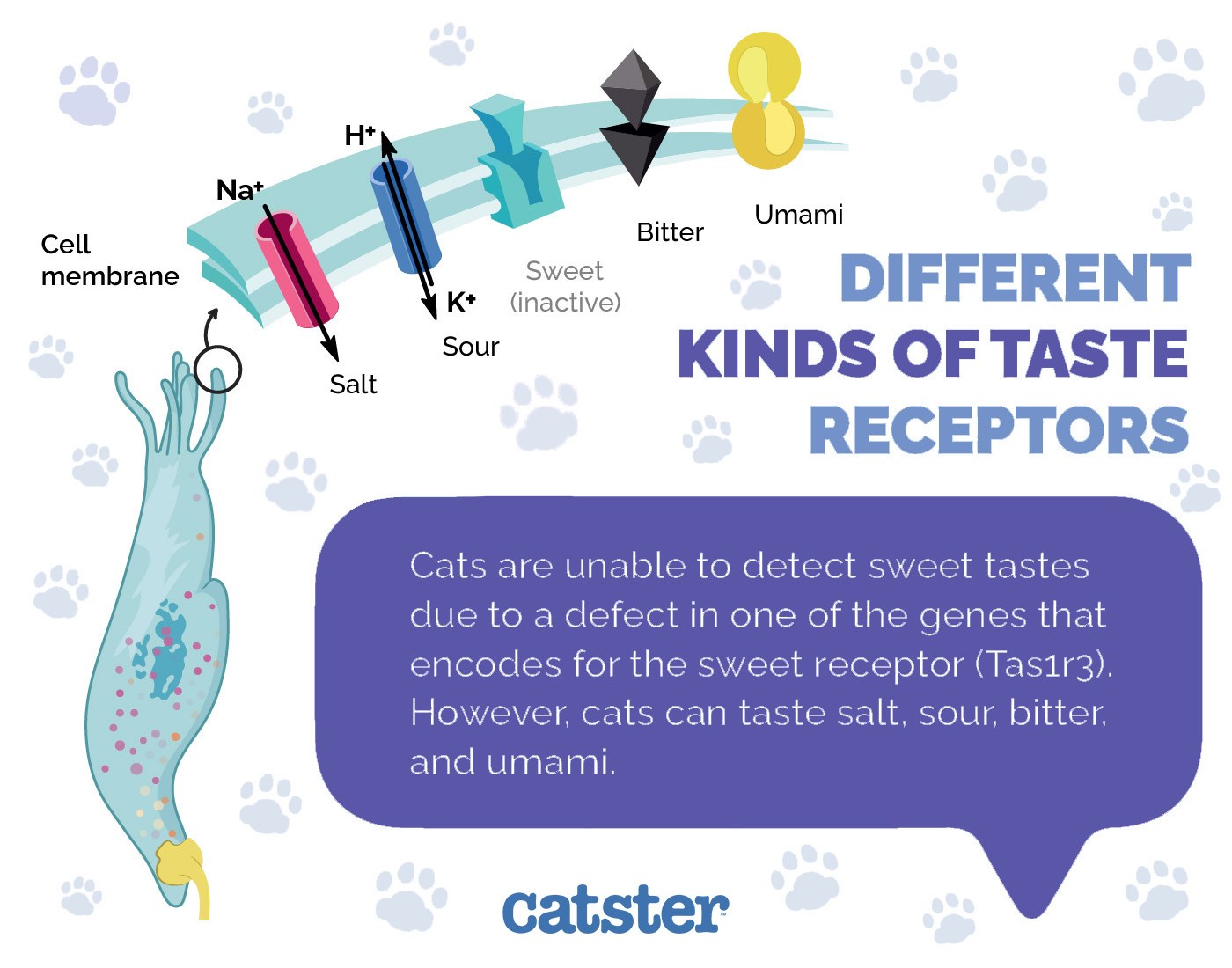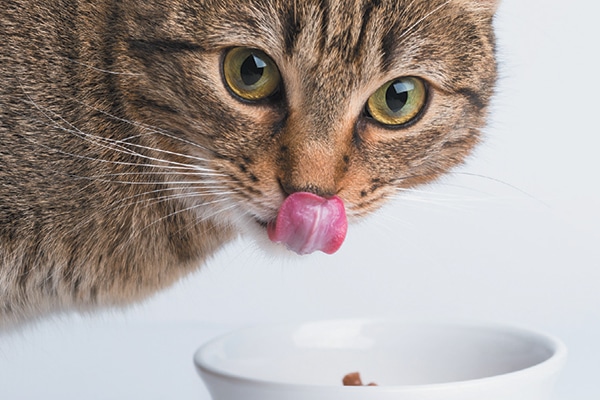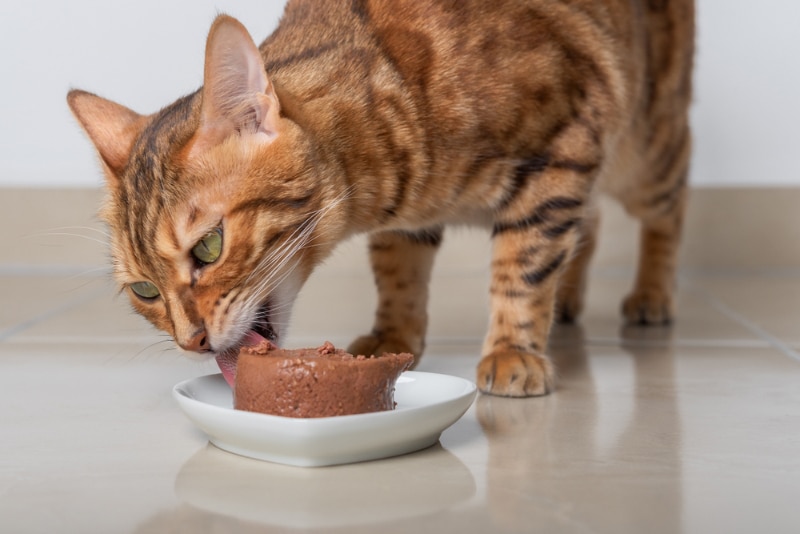Click to Skip Ahead
If you’re a connoisseur of fine dining, you know the joys of tasting delicious food. Compared to a gourmet meal, your cat’s food probably looks quite plain. Most cats prefer one treat or diet over another, but have you ever wondered how cats taste their food? As a general answer, cats taste their food with their almosr 470 taste buds around the edges of their tongues.
In this article, you’ll learn all about your kitty’s tongue, including how many taste buds cats have and what flavors cats can taste. We’ll also talk a little about how taste impacts your cat’s eating habits and why some kitties are picky eaters.
All About the Cat Tongue
If you’ve ever been on the receiving end of a cat lick, you know their tongues are rough. That’s because the tongue’s surface is covered with spiny structures called papillae, which are made of keratin, just like cat claws.
These papillae help your cat keep themselves groomed and assist wild felines in scraping meat off the bones of their prey. Cats can also move these structures, raising them when needed and leaving them flat at other times.
Cats have around 470 taste buds around the edges of their tongues, compared to 9,000 for humans and 1,700 for dogs. Taste receptors are protein structures on the cell surface that recognize and bind to an incoming substance and activate the cell to send a signal to the brain. Based on those numbers, we can conclude that cats don’t taste nearly as well as we do.

What Flavors Can Cats Taste?
Humans can detect sweet, salty, bitter, sour, and umami (savory) flavors. Despite their reduced taste buds, cats can taste all these flavors except for sweet. Research suggests cats lack sweet taste receptors on their tongues because of a defect in one of the genes that normally encodes for the sweet receptor.
They don’t like bitter or sour tastes and have a special dislike for bitter flavors. They have at least 7 different functional bitter taste receptors and tend to reject bitter food, it is thought that this response has developed to help protect them from poisoning. In addition, our kitty friends can detect an additional compound that we cannot, called adenosine triphosphate (ATP). This compound supplies energy in every living cell and is thought to be a signal for meat.


How Taste Impacts Your Cat’s Eating Habits
Cats are considered true carnivores who must obtain their nutrition primarily from animal sources. Knowing this, some of the ways they taste make more sense.
Meat isn’t sweet and wild cats had no reason to be able to detect sweetness. The ability to detect ATP means that cats find meat even more appealing than humans. Cats also rely on several factors to attract them to food, not just taste.
The smell of food is an important consideration, cats have a sense of smell that is about 14 times stronger than a human’s sense of smell. Cats also have a special structure called a Jacobson’s organ in the roof of their mouth, which is also involved in olfaction. If a cat doesn’t like the smell of a food, they likely won’t taste it at all.
Cats develop preferences for certain textures of food. They also prefer warm food, this is likely linked to the stronger smell and perhaps freshness of food.

Why Are Some Cats Picky Eaters?
A cat’s eating habits are shaped partly by instinct and partly by developed preferences. Factors such as their food’s temperature, shape, and texture may impact what they like to eat. For example, some diets may mimic wild prey more closely.
Cats also learn to prefer some foods based on what their mother ate while nursing them and the first diets they ate when weaned. It’s a good idea to offer kittens a variety of flavors and textures, including dry and canned when they’re young. This can make them less likely to be picky when they get older.
In addition, cats can develop food aversions if they eat a diet during a stressful time of life, such as illness or a hospital stay. If your cat is a picky eater, try warming their food or adding warm water to their kibble.
Ensure their food is fresh and the bowl is located away from litter boxes and busy areas of the house. Try (slowly) switching to a different type of food. Cats who normally have a good appetite but suddenly start refusing food may be suffering from a health issue.
If you notice a decreased appetite in your feline, visit your veterinarian for a check-up. Cats can develop a dangerous condition called hepatic lipidosis if they don’t eat enough for even a few days, so don’t delay if you notice a decreased appetite.
Conclusion
Cats taste their food the same way humans do, relying on taste buds on the edges of their tongues. However, because they possess far fewer taste buds, their sense of taste is not as well-developed. Cats can taste all flavors that humans do except for sweet, along with an additional ability to detect ATP which seems to act as a signal for meat. If your cat is a picky eater, the taste of their food is only one possible factor that could be contributing. It’s best to talk to your vet if your cat develops appetite issues of any kind.
Featured Image Credit: Amerigo_images, Shutterstock









